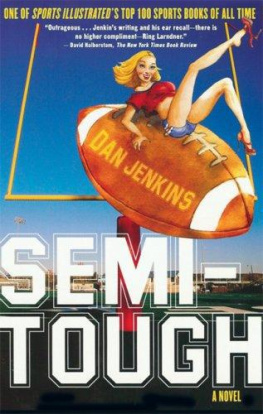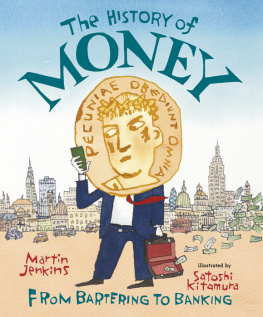THE
DOGGED VICTIMS
OF
INEXORABLE FATE
By Dan Jenkins

LITTLE, BROWN AND COMPANY - BOSTON - TORONTO
COPYRIGHT 1970 BY DAN JENKINS
ALL RIGHTS RESERVED. NO PART OF THIS BOOK MAY BE REPRODUCED IN ANY FORM OR BY ANY ELECTRONIC OR MECHANICAL MEANS INCLUDING INFORMATION STORAGE AND RETRIEVAL SYSTEMS WITHOUT PERMISSION IN WRITING FROM THE PUBLISHER, EXCEPT BY A REVIEWER WHO MAY QUOTE BRIEF PASSAGES IN A REVIEW.
LIBRARY OF CONGRESS CATALOG CARD NO. 7I-IO55 68
FIRST EDITION
Sports Illustrated, Books
are published by
Little, Brown and Company
in association with
Sports Illustrated Magazine
Published simultaneously in Canada
by Little, Brown & Company (Canada) Limited
PRINTED IN THE UNITED STATES OF AMERICA
Foreword
He stands out vividly from the majority of the writers in the press tent. At-the close of a golf tournament, most of the others scramble for their typewriters (or the modern machines for transmitting their copy) and thrash out their reports at high speed. They have got to get them done as soon as possible. Dan Jenkins is different. A tall, slim, silver-haired man in a double-breasted blue blazer, he sits at his typewriter the picture of ease as his fingers deftly tap out his story on the Crosby Pro- Amor the Masters or the British Open or the Ryder Cup match. He has a deadline to meet all right. Now, as during the many years he was with Sports Illustrated, his editor at Playboy or Golf Digest wants his stuff as soon as he can get it to them, which means yesterday if he is describing the playoff of our Open or the British Open. You would never guess this from Jenkins' demeanor. He sits at his typewriter with his back as straight as a cadet's, his eyes practically expressionless as each new line succeeds the line above. When someone comes over to ask him a question, he is never harried and, as often as not, he is light-hearted during the exchange. From time to time he interrupts his magisterial calm to light up a cigarette. In about two hours his story is finished and on its way to the magazine. He tightens the knot in his tie, adjusts his jacket, and glances at his watch to see how much time he has at his disposal before he meets some friends for a late dinner.
When people across the country read Jenkins' right-after-the-event articles, they marvel at their off-beat introductions, the humor which illuminates the reportage, the soundness of his treatment of the principal figures and the core of the action, the idiosyncratic asides that he tosses in because he likes them, and an ending that is sometimes ironic and at other times echoes a point he has made. Invariably, the reader has no sense whatsoever that the man who banged out the report had a deadline to meet, and, don't forget it, most people who write would rather meet Primo Camera than a tight deadline.
At one time it was fashionable to say that Dan Jenkins seldom went out onto the course to watch the play in a golf tournament, preferring to mosey over to the headquarters television trailer where the director, studying the numerous screens grouped around him, calls out which camera's coverage he wants to appear on the telecast. Dan knows the directors well, and he is happy to accept their invitation to drop in at the headquarters trailer. It is both a pleasant and sagacious thing to do. Out on the course, a reporter can't watch the various contenders and see all the shots that have to do with the winning and losing of the event. Jenkins, however, spends a lot of time on the course. With his sense of where the key action may take place, he sees as many of the crucial shots as nearly anyone. He knows the players well, and during a tournament he spends a good deal of time chatting with them off the course. On the day of the final round, he often chooses to watch the decisive holes in the Hospitality Room, listening to what the players who finished earlier have to say about the climactic action of the tournament. He never scribbles anything down. With his wonderful ear, he takes note of and retains their savvy and incisive comments.
As a natural editor of the immense amount of material he gleans, Dan has the time and the disposition to relax with his friends around a table during the unimportant hours of the long, tedious tournament days. The Jenkins Group, as it has come to be called, is made up of fellows like Bob Drum, Pat Summerall, Blackie Sherrod, Dave Marr, Bud Shrake, Sonny Jurgenson, Ed Sneed, Jack Whitaker, Ben Wright and sundry other writers, telecasters, and retired quarterbacks. At the Masters, they convene at one of the long tables in the upstairs lounge of the clubhouse, but wherever a significant tournament is being held, they stake out a point of assembly and almost instantly make themselves at home. If Dr. Johnson or Robert Benchley were to walk by, they would be asked to pull up a chair. Johnson and Benchley had all the requirements necessary to be eligible for the Jenkins Group: a knowledge of golf and other sports; a sense of humor, preferably droll; a critical wit that knows what is corny and synthetic; a genuine pleasure in listening to their friends' banter; a better than average background in literature, history, and the arts; and, above all, a convivial nature.
Dan Jenkins was born in Fort Worth, and graduated in 1949 from Paschal High, long famous as the high school that Ginger Rogers and Ben Hogan went to. A week before Jenkins graduated; he was hired to cover golf by Blackie Sherrod, the sports editor of the Fort Worth Press. 'Blackie knew I'd be entering T.C.UTexas Christian Universitythat fall," Jenkins says. "I went to college with a byline." Jenkins has been around golf all his life. His father, a furniture salesman, was a golf addict. Jenkins Sr. played some golf with another local fellow, Ben Hogan, at a course called Katy Lake, a nine-hole layout with sand greens, which got its name from a nearby spur of the Missouri, Topeka, and Kansas City Railroad. Dan, who had been the medalist in the Fort Worth Junior Championship when he was fourteen and fifteen, went on to become a potent force on the T.C.U. golf team, and in his senior year, 1953, he was its captain. One thing Dan has in common with Ben Hogan and Byron Nelson is that each of them at one time or another was the runner-up in the Fort Worth City Championship. Another thing he remembers well is a trip he made to Albuquerque to play in an N.C.A.A. Championship. "I thought I was a pretty fair golfer until that tournament," he recalls. "Then I got a look there at a fellow named Ken Venturi from San Jose State, and I began to understand things better."
Jenkins got to New York in 1962, when he joined the staff of Sports Illustrated. He had been a stringer for S. I. when he worked for Fort Worth and Dallas newspapers after graduating from T.C.U. Alfred Wright was then writing the golf for S.I. Jenkins was the back-up golf writer and the head college football writer. In 1967, he became the head golf writer. He was successful from the start, because he was an original. His terse, dry, irreverent style went down so well that it was alleged that young sports writers throughout the country were copying it. One who doesn't is his daughter Sally, who graduated from Stanford about a year ago and is now a sports writer for the San Francisco Chronicle. His two sons, Marty (who is Sally's twin) and Danny, have yet to give any decisive indication which profession or business they plan to pursue. Dan lives in Manhattan with his dazzling wife June. She and two other bright girls from Texas, who also had an excess of free time on their hands, started and operate two successful New York restaurants, Summerhouse and Juanita's.















